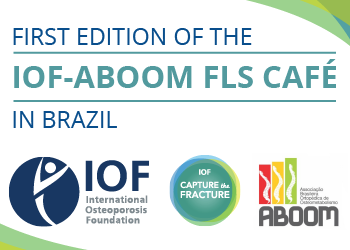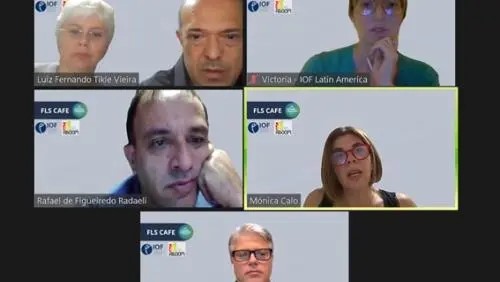First Edition of the IOF-ABOOM FLS Café in Brazil

FLS coordinators and team members shared experiences and best practices in this unmissable event for those interested in implementing an FLS.
 On April 15th, the first edition of the FLS Café, jointly organized by the International Osteoporosis Foundation (IOF) and the Brazilian Orthopedic Association of Osteometabolism (ABOOM) was held. The main topic was how to establish a post-fracture care coordination (PFC) program, such as a Fracture Liaison Service (FLS). The seminar was aimed at physicians and healthcare professionals with an interest in initiating an FLS or in an early stage of implementation.
On April 15th, the first edition of the FLS Café, jointly organized by the International Osteoporosis Foundation (IOF) and the Brazilian Orthopedic Association of Osteometabolism (ABOOM) was held. The main topic was how to establish a post-fracture care coordination (PFC) program, such as a Fracture Liaison Service (FLS). The seminar was aimed at physicians and healthcare professionals with an interest in initiating an FLS or in an early stage of implementation.
Dr. Francisco Paranhos de Paula Neto, president of ABOOM, opened the session and addressed the epidemiology of fractures in Brazil and the importance of fracture prevention, "it is estimated that by 2030 the total number of fractures in Brazil will increase by 60% due to the aging of the population," he said.
Monica Calo, IOF Regional Manager for Latin America and leader of the Capture the Fracture® (CTF) program initiatives in the region, presented the program and its mission of secondary fracture prevention. She highlighted the sustained growth of the program in Brazil, where FLS increased by 73% between 2019 and 2023, mainly coordinated by orthopedic surgeons, and where the first gold center in the entire region was registered.
A total of 59 participants connected live via Zoom, coming from 30 different cities in the country. Of the total, 65% had implemented an FLS at their own institution, while 35% did not yet have one but were interested in moving forward in establishing one.
During the session, speakers shared guidelines for the creation and operation of an FLS. At the same time, national success stories were presented by the clinicians responsible for the success: Dr. Rafael de Figueiredo Radaeli (coordinator of the Silver Star FLS, Unimed Bebedouro) and Dr. Polyana de Vargas Teixeira (member of the Gold Star FLS, Polyclinic Osvaldo Cruz).
Dr. Luiz Tikle Vieira, FLS mentor and coordinator of the Gold Star FLS Osvaldo Cruz Polyclinic, said: "Fragility fractures are common and affect people's quality of life. The implementation of an FLS makes it possible to identify patients, assess their fracture risk, initiate personalized treatment, and monitor their progress. It is crucial to encourage the creation of new FLS and strengthen existing ones." Monica Calo added, "Post-fracture care coordination programs are designed to bridge the gap in the care of patients with fractures, 80% of whom are currently not being evaluated or treated for osteoporosis. FLS are the proven solution to improve communication between healthcare providers and provide a pathway of care for patients with fragility fractures."
At the end, space was provided to share good practices, exchange experiences and establish collaborative networks to continue strengthening the FLS community in all regions of Brazil. Visit the CTF Best Practice Map and find an FLS in your city.